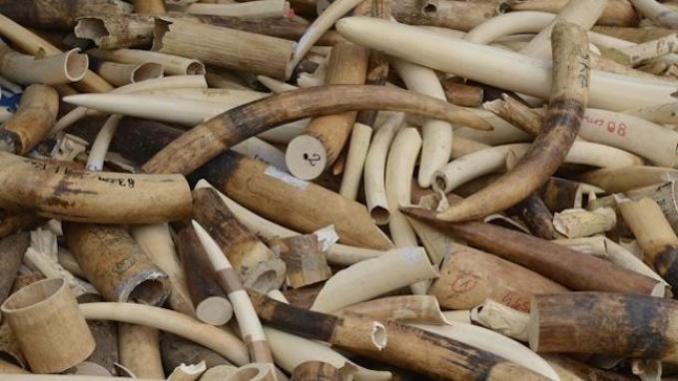Ivory trade and its impact on Uganda’s wildlife conservation efforts
The UPDF has been a key player in Uganda's fight against poaching, often collaborating with UWA to patrol conservation areas.

In a twist that has raised eyebrows across Uganda, a soldier from the Uganda People’s Defence Forces (UPDF) has been sentenced for his involvement in the illegal ivory trade.
Sgt. Godfrey Kisembo, a 50-year-old member of the 81 Battalion, has been handed a one-year and 11-month jail term by the UPDF Unit Disciplinary Court (UDC) for extracting ivory from a dead elephant and attempting to sell it. The case has sparked fresh debates on the role of security forces in wildlife conservation and the urgent need to combat poaching.
Kisembo’s case is a stark example of how poaching syndicates can infiltrate unexpected quarters. As a detach commander, Kisembo was expected to protect wildlife in his area of jurisdiction. Instead, when informed by local civilians about a dead elephant in May 2024, he saw an opportunity for profit.
Teaming up with Pte Isaac Obong, Kisembo extracted ivory from the carcass rather than reporting the incident to his superiors. Their illegal venture was cut short when rangers from the Uganda Wildlife Authority (UWA) arrested them while they were seeking potential buyers.
Lt. Col. Nathan Kakawate Mwesigwa, who presided over the court session in Lira Kato Sub-county, did not mince words in his condemnation. “This offense is classified as conduct prejudicial to good order and discipline under the UPDF Act. It is a grave betrayal of the values the military stands for,” he stated during the sentencing.
This incident has exposed a troubling intersection between military personnel and wildlife trafficking. Dr. Andrew Seguya, a conservation expert, explains that while the UPDF has played a vital role in anti-poaching efforts, such incidents highlight the vulnerability within the ranks.
“When those tasked with protecting our natural resources become perpetrators, it complicates the fight against wildlife crime. It calls for stricter oversight and education within the security forces,” he noted.
The illegal ivory trade remains one of the most lucrative black-market businesses, with global demand threatening the survival of African elephants. Uganda, with its vast conservation areas like Murchison Falls and Kidepo Valley National Park, is a critical battleground in the fight against poaching.
According to a report by the Uganda Wildlife Authority, elephant populations in Uganda have been slowly recovering after decades of decline. However, cases like Kisembo’s serve as a grim reminder of the persistent threats posed by poaching syndicates.
Community Engagement: A Missed Opportunity
The involvement of local civilians in reporting the dead elephant initially offered a glimmer of hope for effective community-based conservation efforts. Yet, their trust was shattered when Kisembo chose to exploit the situation. Lt. Martin Oryem, Assistant Warden at the Kidepo Valley Conservation Area, underscored the importance of community cooperation in curbing poaching activities.
“We rely heavily on local communities to report wildlife incidents. It is disheartening when individuals in positions of power exploit this trust for personal gain,” he remarked.
Oryem also warned of the severe consequences of poaching, highlighting that individuals caught with wildlife products like ivory face a minimum sentence of seven years under Ugandan law. He urged communities to report stray or dead animals directly to the Uganda Wildlife Authority rather than taking matters into their own hands.
The UPDF has been a key player in Uganda’s fight against poaching, often collaborating with UWA to patrol conservation areas. However, this incident has sparked calls for enhanced training and stricter monitoring of military personnel stationed in wildlife-rich regions. Conservation organizations have suggested integrating wildlife protection modules into the military training curriculum to sensitize soldiers about the importance of biodiversity and the severe impacts of poaching.
“We must ensure that our soldiers understand their role in conservation and the consequences of engaging in illegal wildlife trade,” said Lt. Col. Richard Watmon, Commander of the 507 Brigade. He emphasized that discipline and respect for the law are non-negotiable in the military’s code of conduct, reflecting the ideological principles that guide the UPDF’s work.
As Uganda continues to battle poaching, cases like Sgt. Kisembo’s highlight the need for stronger wildlife protection laws and better enforcement mechanisms. Advocacy groups are pushing for harsher penalties for military personnel involved in poaching, arguing that those in positions of authority should face more stringent consequences to deter others.
The arrest and sentencing of Kisembo send a clear message, but it also raises critical questions about accountability within the military. Will this case be a turning point in addressing the involvement of security personnel in wildlife crimes, or just another blip in the ongoing struggle to protect Uganda’s rich biodiversity? The answer lies in how swiftly and decisively both conservationists and the military respond to this breach of trust.
As the dust settles on this shocking revelation, one thing is clear: the fight against poaching requires a united front where protectors do not turn perpetrators, and the guardians of Uganda’s wildlife are held to the highest standards of integrity.






